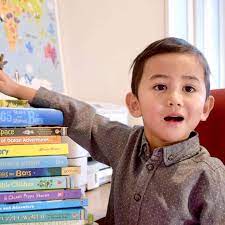Lucy Caulkett-
A young British three-year-old genius who taught himself to read at the age of two reportedly has an IQ of 139 and is officially the youngest member of MENSA.
Teddy Hobbs, from Portishead in Somerset,(pictured) is being celebrated across the world for his remarkable ability to read books like Harry Potter at age two, and has taught himself to count to 100 in six other languages, according to reports.
The IVF treatment child to parents Beth and Will Hobbs, were unaware how smart he was until they assessed for school in September last year.
Teddy Hobbs has now been admitted to the exclusive organisation for the intellectual ‘elite’ of MENSA at aged just three years and nine months, an extraordinary privilege for a child as young as her.
The child prodigy from Portishead, Somerset, can already count to 100 in six non-native languages, including Mandarin, Welsh, French, Spanish and German, Claims that the very young child can score high in mentally tasking IQ questions involving deductions and solving alphabetic and numerical sometimes complex puzzles expressed in the form of patterns defies belief.
The Daily Mail reports that Teddy, now four, taught himself to read at just two years and four months – and is now capable of even reading Harry Potter books when his parents permit.
How well Teddy can read Harry Potter books is to be openly demonstrated.
Little Teddy was admitted to Mensa late last year after smashing an IQ test with the group, scoring 139 out of 160 on the Stanford Binet test and shocking his parents, who had no idea quite how smart he was.
His mother Beth, told the Metro on Sunday said: “We did an IQ test, where we basically told him he was going to sit and do some puzzles with a lady for an hour, and he thought it was the most wonderful thing.
“After he completed it we were told he was eligible by Mensa’s child advisor, so we thought he may as well join.
“We were a bit like “pardon? We knew he could do things his peers couldn’t, but I don’t think we realised quite how good he was.”
His mom said that they are not linguists and have joked about the embryologist. They think perhaps he made a mistake, used the wrong vial or made some kind of other error that made him this way.
She said there are some challenges having a child this smart, because he listens to everything and remembers everything. He also shows little interest in normal boy’s activities. Instead, he likes to learn new things and to play with computer apps.
Child geniuses turn up every so often and are expected to achieve high things in their later year, though not all child geniuses reproduce their genius as adults. Those who do not display the same amazing level of genius as adults are believed to either have the the genius talent suppressed due to potential external challenges, including depression stress, apathy, and a number of other issues. Other times, child geniuses in adult life are reflecting their special talent in ways not yet established.
In 2021, Dayaal Kaur, from Great Barr, was celebrating when it was discovered she could count to 15 when she was just 13 months old, and also recite the entire alphabet.
Sarbjit Singh said he realised early on that they were raising a child genius, when he and his daughter could chat before she was even out of nappies. Super abilities like that in some children are considered strong indication of genius, though there are many geniuses who may not have exhibited such wonder in their nappies.
Her parents, Sarbjit and Raj, decided to arrange for a Mensa test – and were astounded to find their daughter’s intelligence was at the 99.9th percentile for her age and that she had the word recognition and maths abilities of a five-year-old.
Several child geniuses have emerged over the years, but insufficient level of scrutiny of all the claims, with some extraordinary claims like that of a baby reading and talking in their nappies, lacking any solid trace of evidence to support theit.

